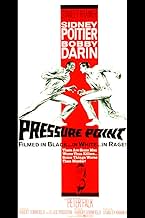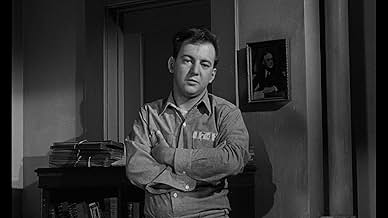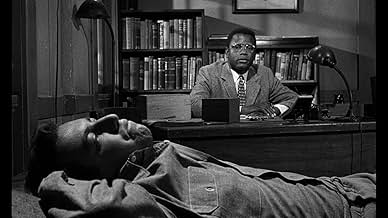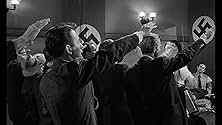A Black prison psychiatrist is assigned the distasteful task of helping a paranoid American Nazi charged with sedition.A Black prison psychiatrist is assigned the distasteful task of helping a paranoid American Nazi charged with sedition.A Black prison psychiatrist is assigned the distasteful task of helping a paranoid American Nazi charged with sedition.
- Awards
- 1 nomination
- Father
- (uncredited)
- Bund Meeting Spectator
- (uncredited)
- Inmate
- (uncredited)
- Bund Meeting Spectator
- (uncredited)
- Patient
- (uncredited)
- Director
- Writers
- All cast & crew
- Production, box office & more at IMDbPro
Storyline
Did you know
- TriviaProducer Stanley Kramer directed the framing story, which refers to the present-day story that Sidney Poitier tells to Peter Falk.
- GoofsThe calendar visible on the wall of the Doctor's office in 1942 is not correct for that year. (It would be correct for 1962.)
- Quotes
Doctor: [angrily to the Patient] This is my country! This is where I've done what I've done, and if there were a million cruds like you, all sick like you are sick, all shouting, 'Down, destroy, degrade,' and if there were 20 million more sick enough to listen to them, you are still gonna lose! You're gonna lose, Mister, because there is something in this country, something so big, so strong that you don't even know... something big enough to take it from people like you and come back and nail you into the ground. You're walking out of here? You are going nowhere! Now get out!
- SoundtracksHere Comes the Bride
("The Bridal Chorus") (uncredited)
Composed by Richard Wagner (1850)
Sung at bund meeting
This film is actually flashbacks in a flashback, but it works and is not confusing. It starts with a young psychiatrist (Peter Falk) charging into his boss' office (Sidney Poitier) and saying he cannot successfully treat the patient he has because the patient is black and hates him because he is white. Poitier responds by telling him that he really knows how he feels and tells the tale of how, in 1942, as a young psychiatrist, he treated an American Nazi (Bobby Darin) in a prison hospital who looked down on him because he was black.
Bobby Darin's character has been unable to sleep and has been passing out. The doctor probes into his past and finds the usual tropes of the abusive drunken dad and enabling mother who deals with the situation by becoming a hypochondriac. Darin's character grows up to be an abusive violent person himself, ultimately finding himself in the American Nazi party. Poitier's character correctly mentions that millions of people must have come from situations as bad as his patient, but have managed to conduct themselves without violent actions or delusions. I would mention the actual names of the characters, but the film simply calls the characters - Doctor, Patient, Jewish Girl, etc.
I won't say much more because I don't want to give away anything. This works because of the great dialogue and performances. Bobby Darin didn't make very many movies because of his short life, but this is a great chilling performance. Sidney Poitier gave many great performances in his long career, so I think this one is probably under appreciated because of that. Let me also mention the person who plays Darin's character as a child - Barry Gordon. He let's the viewer feel the loneliness and powerlessness of the character as a child, leading him to have a total lack of empathy as an adult.
- How long is Pressure Point?Powered by Alexa
Details
Box office
- Budget
- $1,000,000 (estimated)
- Runtime1 hour 31 minutes
- Color
- Sound mix
- Aspect ratio
- 1.85 : 1
Contribute to this page

































